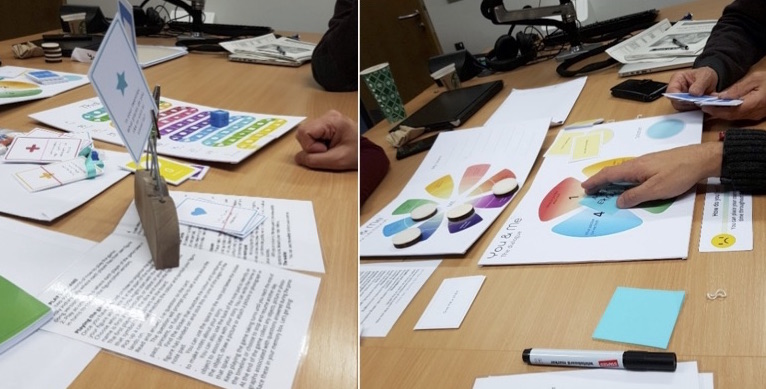In December, colleagues from INTRAS and University Politechnico Catalunya (UPC), Spain, met in the UK at Nottinghamshire Healthcare NHS Foundation Trust. The team continued preparing for the evaluation of the Good Life Kit (GLK) and for a further Public and Patient Involvement (PPI) Group event where the first GLK prototype was introduced.
The Good Life Kit aims to support people with Dementia in approaching everyday life positively and confidently. The first prototype of the Good Life Kit arrived from partner Twente University in the Netherlands, where the prototypes are produced, in time for the PPI event. Colleagues worked together to plan the PPI event, prepare the materials for the session in a user-friendly format, and send out relevant information to participants in advance.
A convivial PPI event allowed all participants to sample the GLK and suggest how it should be used within the evaluation. After the welcome, a warm-up task enabled everyone to try out skills as interviewers to gather ‘essential’ group information such as who was wearing clean socks, who took their phone to bed and who had done their Xmas shopping!
Next, a goldfish bowl activity enabled sets of volunteers to play the ‘This Is Me’ game, which is one of the three parts of the GLK, while others observed and made notes. Emergent experiences unlocked within the game were powerful, and players supported one another to share the vivid recollections. Lively discussion followed, producing some excellent feedback.
Mind colleagues then shared their experiences with own research in social robotics and previous experiences with and hopes for the PPI group at INTRAS, Valladolid, Spain. A lunch with seasonal treats encouraged friendly networking before two mixed teams each tackled the second and third part of the GLK, ‘You and Me’ and ‘Living the Life’.
It was noticeable with both ‘This Is Me’ and ‘Me And You’ that guidance needs to be simple and clear while players also chose to make up their own rules and this flexibility was seen as positive. After a lively day, brief minutes in mindful spaces encouraged by the activities of ‘Living The Life’ enabled a tranquil wind-down before people departed taking the remaining mince pies and chocolates home with them.

